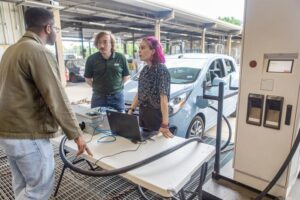Solar farm for testing robots completed in York
Siemens complete work on 200kWp solar farm at University of York’s Institute for Safe Autonomy as part of wider, £1.5m research programme.
The new farm spans more than 1,400 m2 and comprises different panel configurations including a sun-tracking array and static ground installations. There are also panels mounted on the side and roof of institute itself as building-integrated photovoltaics (BIPV).

Photo courtesy of Siemens
This variety means that the new solar farm can operate as a ‘living lab’, where the institute’s team can develop and test robots and other autonomous systems in inspecting and maintaining a range of different solar arrays. This work will provide landowners and operators of solar farms with insights into how best to integrate robotic tech out in the field.
In addition, the solar farm is expected to generate more than 80% of the institute building’s 600kWh daily use, making a significant contribution to achieving the ambition of being net zero by 2025.
The institute’s purpose-built facility provides collaborative work and test spaces for more than 100 researchers working across a range of disciplines, all within the context of a safety-critical approach to the design, development and testing of robotics and connected autonomous systems. The building opened in 2022.
For this new initative, Siemens provided consultancy services and helped to design, commission and optimise the solar arrays for the robotic tech. The company also set up a data collection system for the panels that will underpin the research projects conducted here.
The arrays were installed by LYNX Sustainable Solutions Ltd. The initiative has been supported UK Research Partnership Investment Fund (UKRPIF). It is one of nine projects to improve environmental sustainability that UKRPIF has provided with almost £19m in total.
Professor Miles Elsden, Director of the Institute for Safe Autonomy, says: ‘Robotics, autonomous systems and AI have the potential to transform the way we live, travel and work in the future. Integrating them with the production of renewable energy will ultimately play a key role in the journey towards net zero. This innovative research project marks an important milestone for the Institute since we opened earlier this year and reaffirms our commitment as a university to sourcing sustainable energy.’
Andrew Smyth, Head of Energy Performance Services at Siemens, adds: ‘Through the solar farm the University will gain valuable insights to enhance the use of robotic technology, as we continue to look to integrate it into our everyday lives. We are seeing this technology deliver meaningful change across a range of industries and it will form a key pillar of our Transform 2024 conference as we bring together industry leaders to debate these key issues.’
In related news:
Opinion: Navigating the BT PSTN Switch-Off in critical calling for healthcare
Local government study shows most staff and councillors ‘unengaged’ in digital
















Leave a Reply